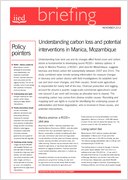Understanding carbon loss and potential interventions in Manica
-----------------
 Understanding how land use and its changes affect forest cover and carbon stocks is fundamental to developing sound REDD+ delivery options. A study in Manica Province, a REDD+ pilot area for Mozambique, suggests biomass and forest carbon fell substantially between 2007 and 2010. The study combined radar remote sensing information (to measure changes in biomass and carbon stocks) with field investigations (to establish land use and land cover changes, and their causes). Small-scale agriculture is responsible for nearly half of the loss. Charcoal production and logging
Understanding how land use and its changes affect forest cover and carbon stocks is fundamental to developing sound REDD+ delivery options. A study in Manica Province, a REDD+ pilot area for Mozambique, suggests biomass and forest carbon fell substantially between 2007 and 2010. The study combined radar remote sensing information (to measure changes in biomass and carbon stocks) with field investigations (to establish land use and land cover changes, and their causes). Small-scale agriculture is responsible for nearly half of the loss. Charcoal production and logging
account for around a quarter. Large-scale commercial agriculture’s small role (around 3 per cent) will increase as allocated land is cleared. The remaining carbon loss comes from diverse smaller causes. Recording and mapping land use rights is crucial for identifying the underlying causes of deforestation and forest degradation, who is involved in those causes, and potential interventions.
---------------

